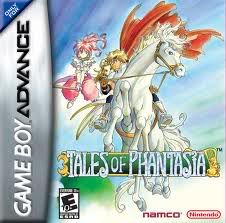
North Americans tend to get the short end of the stick when it comes to Namco-Bandai’s Tales series, for instance, with none of the Nintendo DS installments of the franchise seeing the light of day outside Japan. When the franchise commenced on the Super Famicom with Tales of Phantasia, non-Japanese gamers missed out on it, as well, not to mention the Sony PlayStation remake. In 2003, Namco developed a port for the GameBoy Advance fusing elements from the Super Famicom and PlayStation, with an emphasis on elements from the latter iteration, this version seeing a North American release three years later. Tales of Phantasia GBA is by no means the best version of the game, but provides a decent opportunity for players to experience the first Tales game legally.
Like the previous versions, Phantasia GBA features random encounters, with the rate of random battles being lower than in the Super Famicom version, and increasable and decreasable respectively by Holy Bottles and Dark Bottles. Fights in the GBA port more or less echo those in the PlayStation version, although the pace is somewhat slower (and the action of battle still stops during many spell animations), sure to alienate those spoiled by the speed of battles in that particular version. However, fights still move at a decent pace, and the ability to reduce the random encounter rate prevents battles from becoming too monotonous. The slower pace and the cheapness of a few specific enemies are the only real shortcomings of the battle system, which is definitely a step up from that in the Super Famicom version, but not as enjoyable as that in the PlayStation version.
Because of the Gameboy Advance’s smaller screen, Phantasia GBA’s menus feel more cluttered than in previous iterations, with smaller windows potentially blocking the player’s view of larger windows while navigating the main menus or shopping interface. There is also occasional poor direction on how to advance the main storyline (which sometimes requires the player to talk with specific NPCs), the sometimes-poor spacing of save points, and the oddity of not being able to move diagonally in towns and dungeons but on the overworld. Overall, interaction is only a little above average.
The story is fairly decent, with the playable characters containing decent development (with backstory for each character occasionally viewable when sleeping at inns), and the villain nicely fleshed out and having a motive that’s revealed towards the end. One thing that mars the plot, however, is the poor translation job, filled with plenty of errors and things such as “Ragnarok” mistranslated as “Kangaroo” (to understand how the translators made this error, type “Ragnarok” into a word processor and right-click it to see the list of “corrections”. Ultimately, the story is good, but the translation definitely doesn’t do it justice, even if it’s more loyal to the original script than DeJap’s translation of the original version.
Motoi Sakuraba’s soundtrack is still decent in spite of the Gameboy Advance’s somewhat shoddy audio quality, and in battle are English voices, though their quality, particularly in the opening non-interactive battle, is hammy at best, but not terrible, and there are incongruities such as characters saying “I won!” or “I did it!” in the presence of allies.
The graphics appear more colorful than those in the PlayStation version, with the overworld bequeathed from the Super Famicom version and actually looking better than the PSX port’s world map, although there is the matter of slowdown that somewhat bogs down battle.
The Gameboy Advance version is about as long as previous versions, with some occasional sidequests and a New Game+. Ultimately, Tales of Phantasia GBA is for the most part a decent port, what with its solid Tales battle system, but definitely isn’t the strongest iteration of the game, what with the slowdown in battle, cluttered menus, and especially the subpar localization. While it is definitely nice for there to be a way for North American players to experience the game legally, it would have been better had North American players received superior versions of the title, such as that on the PlayStation or one of the two PlayStation Portable remakes.
The Good:
+Solid Tales battle system.
+Great music and graphics.
+Good story.
The Bad:
-Some slowdown during battle.
-Cluttered interface.
-Weak localization.
The Bottom Line:
Better than the Super Famicom version, but not as good as the PlayStation and two PSP versions.
Score Breakdown:
Platform: GameBoy Advance
Game Mechanics: 8/10
Controls: 6/10
Story: 7/10
Music/Sound: 8/10
Graphics: 8/10
Localization: 5/10
Lasting Appeal: 9/10
Difficulty: Moderate
Playing Time: 20-40 Hours
Overall: 7.5/10









